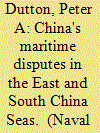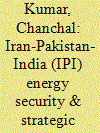| Srl | Item |
| 1 |
ID:
133060


|
|
|
|
|
| Publication |
2014.
|
| Summary/Abstract |
China pursues its security through interior strategies that involve the development of rings of security around central areas of national interest. The Chinese have long felt vulnerable from the sea, and their current maritime strategy seeks to reduce that vulnerability by extending a ring of maritime control around China's periphery. China pursues this control through a combination of forcestructure development and legal assertions. Tensions arise because China's strategy conflicts with the territorial claims, resource interests, and security concerns of other states in East Asia. China's strategy also causes friction with the United States, which relies on freedom of navigation in maritime East Asia for American security interests and which must reassure regional allies and partners that American security guarantees are meaningful. In order to ensure the position of the United States in East Asia, American policies must focus on maintaining the region as an open, maritime system. This requires continuous development of technological advantages to ensure that the center of power in Asia does not migrate from the maritime domain to the continent. It also requires the United States to support the ability of allies, friends, and partners to resist China's nonmilitarized coercion, as well as to reinforce the normative structure that supports the efficacy of maritime power in the region and around the globe.
|
|
|
|
|
|
|
|
|
|
|
|
|
|
|
|
| 2 |
ID:
137719


|
|
|
|
|
| Summary/Abstract |
We do not yet have strong evidence that the rally effect motivates domestically vulnerable leaders to become engaged in international conflict. We draw upon mechanism design to argue that, if anything, diversionary incentives should be associated with a greater likelihood of being the target of disputes, though the conditions under which the result obtains are restrictive. Our analysis of all dyad-months involving the United States and its rivals for the period from 1956–1996 yields suggestive evidence of the unconventional behavior anticipated by our model, while failing to find evidence of patterns anticipated by either traditional diversionary accounts or strategic conflict avoidance. These results suggest that if we are to better understand international conflict by focusing on diversionary incentives, which may not be very useful, we should focus on the behavior described by our formal model rather than that anticipated by either traditional diversionary accounts or strategic conflict avoidance.
|
|
|
|
|
|
|
|
|
|
|
|
|
|
|
|
| 3 |
ID:
138385


|
|
|
|
|
| Summary/Abstract |
The important lessons learnt from the trilateral negotiations on the IPI pipeline reflect variance in legal, institutional, economic and trade laws and practices prevalent in the three countries. The project highlights the complexities of cross border pipeline projects, ranging from a macro view in which geopolitical forces play a role to a micro view where cross-border technicalities and regulatory issue play a role and, ultimately, how these complexities influence the choices made by the parties involved. The IPI gas pipeline has thus suffered delays common to most other cross border pipelines.
|
|
|
|
|
|
|
|
|
|
|
|
|
|
|
|